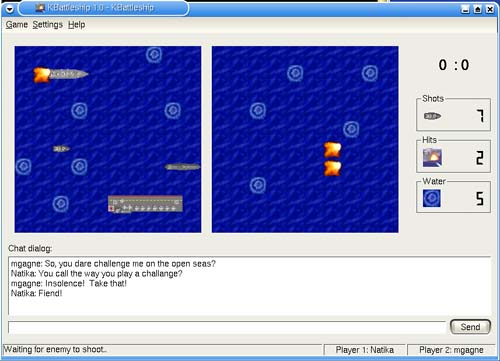B-4. Miss. E-7. Hit!
What I find interesting is how many classic, low-tech games (you don't get much lower tech than playing cards) translate well to the computerized world. In the case of multiplayer board games, add a network connection and it all suddenly makes sense. You can play your favorite board games with the person sitting across from you or with someone halfway around the world. The following games can all be played on your local network or with friends in some distant part of the world.
A number of Linux games take full advantage of this capability, starting with KBattleship (command name kbattleship). As you might expect, this is a KDE version of the popular game Battleship. You need two networked computers to play this one. One person runs a server (under the File menu), and the other connects to it.
The rules are simple. You arrange your ships on a grid. In this version, the grid has no numbers or letters to indicate position. When it is your turn to fire, you simply click on a square, where you have to try to sink the opponent's ships. The game also has sound effects. A miss splashes into the water, whereas a hit explodes with the sound of the explosion.
One of the things I particularly enjoy about this game is the chat line. The bottom part of the game screen lets you send instant messages back and forth between yourself and your opponent (see Figure 18-9). Adding a little witty repartee to the game makes it even better.
Figure 18-9. Network naval warfare with KBattleship.

Other network-playable games include KBackgammon (command name kbackgammon) and Atlantik, a network-playable, real estate, Monopoly-like game. It too features a chat area so that you can play with others around the world. Then there's Tenes Empanadas Graciela, or TEG, a network-enabled clone of the Risk world conquest game. Unfortunately, that one isn't on your disk, but if world conquest appeals to you, visit http://teg.sourceforge.net and start building your empire.
Of course, one of the oldest and most popular board games in the world is chess. On your disks and perhaps already installed, you will almost certainly find xboard (and that is the command name). For the Mahjongg fans out there (the classic Eastern tile-matching game), there is a KDE version (command name kmahjongg) and a GNOME version (command name mahjongg).







